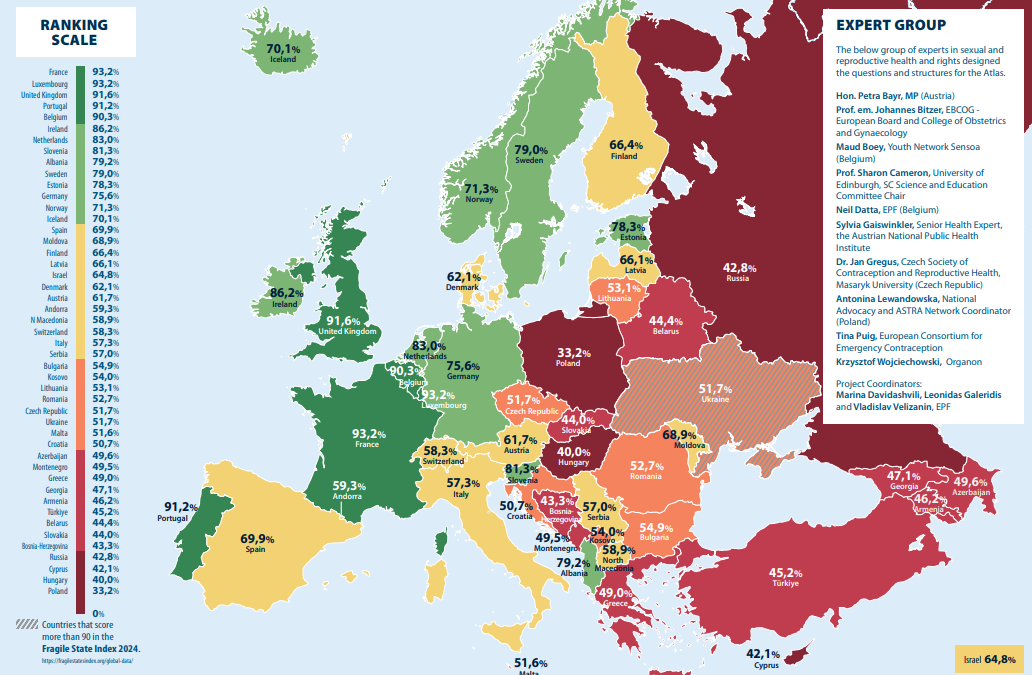Keep our news free from ads and paywalls by making a donation to support our work!

Notes from Poland is run by a small editorial team and is published by an independent, non-profit foundation that is funded through donations from our readers. We cannot do what we do without your support.
Poland has again been ranked as the worst country in Europe for access to contraception in the annual Contraception Policy Atlas.
It has held that position since 2019, when the country was governed by the national-conservative Law and Justice (PiS), and remains there amid unfulfilled promises by the current more liberal ruling coalition to improve reproductive rights.
The ranking, compiled by the European Parliamentary Forum for Sexual and Reproductive Rights, evaluates 46 European countries based on factors such as cost reimbursement by the health system, availability of counselling, and the level of information provided by authorities.
Each country receives a percentage reflecting its performance. Poland ranked lowest, with a contraception availability score of 33.2%, behind Hungary (40.0%), Cyprus (42.1%) and Russia (42.8%). The highest scores were in France (93.2%), Luxembourg (93.2%) and the UK (91.6%).
@EPF_SRR 8th edition of the European Contraception Policy Atlas presents the state of contraceptive access across Europe.
Congratulations to #France, #Luxembourg, #UK, #Portugal, and #Belgium for your leadership on #SRHRhttps://t.co/sVRKDlYTZF pic.twitter.com/Bsub94QO9r
— UNFPA Brussels (@UNFPABrussels) February 19, 2025
In 2017, the former PiS government ended prescription-free access to emergency contraception (the so-called morning-after pill), a move that reproductive rights groups say makes obtaining them more difficult for most and virtually impossible for some.
Restoring over-the-counter access to emergency contraception was a key promise of the centrist Civic Coalition (KO), the largest group in the ruling coalition that replaced PiS in power in December 2023. Last year, the government approved a bill to that effect, which was passed by parliament.
But conservative President Andrzej Duda, a PiS ally, vetoed it over concerns about access for girls as young as 15. In response, the health ministry introduced a regulation permitting pharmacists to prescribe the pill, eliminating the need to visit a doctor.
However, Polish reproductive rights organisation Federa, which contributed to the Contraception Policy Atlas, notes that, in practice, “the prescription requirement for emergency contraception is still in place”.
Among other obstacles women in Poland face in accessing contraception is the limited number of gynaecologists, particularly in smaller towns, where long waiting times for appointments make it difficult for many to receive care.
Further issues that have dragged down Poland’s score in the ranking are a lack of comprehensive sex education and the fact that girls under 18 must obtain parental consent for medical visits, despite the legal age of consent for sexual activity in Poland being 15.
Additionally, female sterilisation is illegal in Poland, forcing women who seek the procedure to travel abroad, adding financial and logistical burdens.
Sex education has become a political battleground amid Poland's election campaign.
We spoke to students and teachers about how the subject is taught in Polish schools, and to activists leading the debate over the current pro-abstinence curriculum https://t.co/uqiRgxrIkh
— Notes from Poland 🇵🇱 (@notesfrompoland) July 19, 2023
Poland’s abortion laws are also among the strictest in Europe. A near-total abortion ban, introduced under the previous PiS government, allows termination only in cases of rape, incest, or when the mother’s life or health is at risk.
Despite the new government’s pledge to loosen the abortion law, it has so far failed to pass any legislation to that effect. Prime Minister Donald Tusk admitted last year that it may be impossible to do so during the current parliament.
“A year ago, we wrote that the results of the 2024 Contraception Atlas results were a wake-up call for the new government,” wrote Federa. “This year, it is clear they have been ignored.”
However, in 2024, Poland did rise 22 places in the European Atlas of Fertility Treatment Policies after Tusk’s government restored state funding for in vitro fertilisation (IVF) treatment, which had been cut by its PiS predecessor.
Poland's government came to power exactly one year ago on a pledge to end the country's near-total abortion ban.
But that promise remains unfilled, leaving many women angry and disillusioned, write @AlicjaPtak4 and @Chrisatepaauwe https://t.co/q9w8NqP4mI
— Notes from Poland 🇵🇱 (@notesfrompoland) December 13, 2024

Notes from Poland is run by a small editorial team and published by an independent, non-profit foundation that is funded through donations from our readers. We cannot do what we do without your support.
Main image credit: Contraception Policy Atlas Europe 2025 / European Parliamentary Forum for Sexual and Reproductive Rights

Alicja Ptak is deputy editor-in-chief of Notes from Poland and a multimedia journalist. She has written for Clean Energy Wire and The Times, and she hosts her own podcast, The Warsaw Wire, on Poland’s economy and energy sector. She previously worked for Reuters.



















